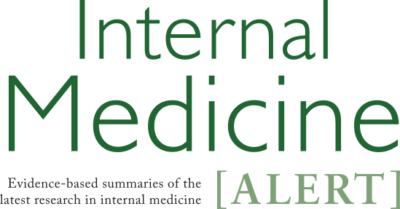
Internal Medicine Alert – August 15, 2004
August 15, 2004
View Issues
-
What Do We Really Know About Adiponectin?
Measures that increase adiponectin levels might be valuable targets for decreasing the risk of atherosclerosis present in patients with diabetes. -
Herbal Medications and Surgery: How Much Do Patients Tell Us?
Herbal medication use is quite common among surgical patients. This pattern is consistent with the recent substantial increase in the use of alternative medical therapies. -
Laparoscopy for Primary Colorectal Cancer Resection
In a prospective, randomized trial, primary excision of colorectal carcinomas by laparoscopic surgery was compared with laparotomy. -
Risk of Clostridium difficile Diarrhea Among Hospital Inpatients Prescribed Proton Pump Inhibitors
Although PPIs are considered to be among the safest of drugs, these studies suggest that PPIs increase the risk for hospitalized patients to develop C. difficile-related diarrhea. -
Pharmacology Update: Tinidazole Tablets (TindamaxTM)
FDA has approved a 5-nitroimidazole for the treatment of trichomoniasis, giardiasis, and amebiasis. Tinidazole, a second-generation nitroimidazole antiprotozoal agent, is marketed as TindamaxTM by Presutti Laboratories. -
Clinical Briefs
Multivitamin Supplements and HIV Disease Progression and Mortality; The Long-term Outcomes of Sibutramine Effectiveness on Weight (LOSE Weight) Study; Trial of Atorvastatin in Rheumatoid Arthritis (TARA) -
ECG Review: The P Holds the Key
The ECG in the Figure was interpreted as showing PVCs (premature ventricular contractions) and chamber enlargement. Do you agree? Can you identify at least four findings keyed by the P in this ECG? -
Pharmacology Watch: The Importance of Publishing Negative Clinical Studies
Sources of funding for pharmaceutical research has come under scrutiny in the last decade as academic and government sources of funding have become increasingly scarce and the pharmaceutical industry has become the main source of research dollars. But the issue of objectivity has been raised, and some have even suggested that negative studies, that is studies that show a drug in an unfavorable light, may never be published.
